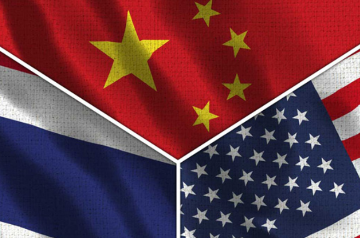"
The Alevis constitute the largest minority group in Turkey. They are believed to form at least one-third of the Turkish population with a large and active Diaspora all over the world
1 . The Alevis are also one of the most marginalised and oppressed minorities in Turkey. With the escalation of sectarian strife in the West Asian region, Alevis are increasingly drawn into the conflict, especially with the protest movements in Turkey and the conflict in neighbouring Syria. Their history of persecution by Sunnis, their identification with Kemalist secularism and associations with Shiite faith have defined their allegiances in the conflict and the nature of their struggle for recognition within the Turkish polity. The Alevi issue is, therefore, a significant contributor to the increasing instability and sectarian polarisation that has engulfed the region, particularly in the last few years.
The Alevis are often referred to as the Turkish counterparts of Syria's Alawites. However, the discourse around Alevism, including ideologies, cultural practices and political orientation, remains fractured. Common western narrative suggests that Alevism is an offshoot of Shiism, albeit a 'heterodox' interpretation of the Shia denomination of Islam
2. Alternative discourse asserts that Alevis are 'neither Shia nor Sunni'
3 . Alevism is significantly distinct from Sunni Islam. Alevis are often mistaken as Shiites because they revere Ali and the first twelve Imams and are thus, 'Twelvers'
4 . The fundamental difference between Shiites and Alevis, however, is that Shiites believe Ali to be the 'vicegerent'
5 of Muhammad and noble but purely human
6. Alevis, on the other hand, view Imam Ali as 'embodying the divine'
7 and the 'incarnation of God
8 '. Alevis do not regard the rituals and practices of Hajj, Zakat, Namaz and Ramadan as binding and do not make the saying of the Kalema (Creed of Islam) a 'condition to faith'. Their religious centres are called cem evleri, which are primarily 'mediums of socialization and not of religious practice'
9 .
They also idolise the founding father of modern Turkey, Mustafa Kemal Ataturk, whose modern and secular vision
10 resounded with the Alevis and promised an end to their persecution as under the Ottoman Empire. They have, thus, always been associated with Kemalist secularism and the Turkish left.
Alevis organise themselves in communities and linguistically, they can be distinguished into four groups. These are the Azerbaijani Turkish in the Kars province, the Arab speaking Alevis from Hatay and Adana provinces and the Turkish and Kurdish (Kurdish and Zaza) speaking Alevi communities. The history of the persecution of the Alevis (Turkish and Kurdish) under the Sunni Ottoman Empire is reflected in the fact that they mostly lived in mountainous regions and isolated villages. It was only from the 1950s onwards that they began to leave these villages in large numbers and settled in the towns of the region or migrated to the large cities in the west
11 . The 'Dersim massacre' in the late 1930s was the largest atrocity committed by the modern Turkish state against the community in which thousands of Alevi Kurds were killed
12 . The Corum Massacre in 1980, the Sivas Massacre in 1993 and the Gazi Quarter riots in 1995 are also amongst the major acts of violence against the Alevis
13.
The ambiguity surrounding the cultural and political identities of the Alevis complicates their interaction with the State and the Sunni citizens of Turkey. Firstly, there are several contentions surrounding the population of Alevis. While general estimates are around 10-12 per cent of the Turkish population, Alevi organisations and scholars have contended that they constitute around 30 per cent (20 million) of the Turkish population
14 . Secondly, the distinction between their ethnic and religious identities has historically determined sentiments of nationalism and secularism within the Alevi communities. Kurdish Alevis, for instance, are torn between their religious affiliations to the Turkish Alevis and their ethnic solidarities with the Kurds.
Even though some Alevi communities are particularly sympathetic to Kurdish nationalism and liberal democracy, majority of them embraced Kemalism as representative of their secular vision and a force against rising Sunni political Islam in Turkey. Alevis perceive 'Islamists and conservative Sunni citizens..as descendants of the Ottoman legacy', and view Kemalism as a ' barrier' to this oppressive legacy
15. However, the failure of the Ataturkist Republican People's Party (CHP) to secure power in Turkey (1950 onwards), and the consistent economic, social and religious persecution have denied the Alevis inclusion into the Turkish polity.
In 2010, Prime Minister Erdogan's Justice and Development Party introduced a series of initiatives aimed at understanding and addressing the identity-issues surrounding the Alevis and other minorities. Even though this is the first time the Turkish state has recognised the persecution of the Alevis and offered a verbal apology for violent acts committed by central authorities
16 , the initiative has been looked upon with considerable scepticism. Leaders of Alevi associations have contended that not only has 'the opening' failed to produce any outcomes, certain initiatives display insensitivity towards the Alevis
17. The Alevis are demanding the recognition of cemevis as their house of worship, the abolition of compulsory religious courses from the schools' curriculum and the dissolution of the country's Religious Affairs Directorate
18 . Moreover, they are also afraid that the 'opening' aims to destroy Alevi tradition and 'assimilate' the community into Sunni identity
19 .
Prime Minister Erdogan also made remarks about the Alevi tradition with particular reference to Kemal Kilicdaroglu, the leader of CHP, and the first Alevi to rise to such a position. He said 'that the Alevis voted for Mr Kilicdaroglu "because he is Alevi", that Cemevis were "cultural centres" and that Muslims prayed only in mosques'. News reports have accused Prime Minister Erdogan of 'pandering to the prejudices of Turkey's predominantly Sunni majority in order to improve his chances of becoming the country's first elected president in 2014'
20 .
As the Gezi Park protests broke out against Erdogan's government in May this year, it was contended that a large number of the protesters were Alevis. Gulizar Cengiz, the leader of an Alevi association, responded to this by saying, 'there is a concern about interference in lifestyles in all parts of the society, including Alevis. It is only natural that they took part in those groups'
21 . News reports also suggest that because Alevis were one of the largest and 'most agitated'
22 of the protest groups, the ruling Justice and Development Party (AKP) is taking steps to pacify the community. For instance, the 'Alevi opening', which had stalled due to a dead-lock between the authorities and Alevi groups, is being revived. AKP MP Hasan Fehmi Kinay announced on June 25 that the 'opening' will move on, officially recognising Alevi places of worship and giving Alevi clerics the same state support as Sunnis so they no longer feel like 'the others'
23 .
Amongst the grievances of the Gezi Park protesters was also Turkey's policy towards the conflict in Syria. Turkey has steadfastly supported the rebel movements, including the Syrian Muslim Brotherhood across the border and advocated external military action against President Assad's regime
24 . The opposition, including the CHP, has accused Erdogan's Syria policy of having a sectarian undertone by its staunch support for the 'Sunni uprising' in Syria against Assad's regime. The spill-over of this sectarianism into Turkey has been reinforced by a proposed law that will split Turkish border provinces Antakya and Hatay into separate Alawite and Sunni quarters. Erdogan, on the other hand, has accused CHP leader Kilicdaroglu of 'being a supporter of Assad solely based on his religion overlooking the fact that..Turkish Alevis are not identical to Syria's Alawites'
25 .
Senor Cagaptay writes that even though Alevis and Alawites belong to different religious and ideological denominations of Islam, they are often assumed to be identical because of the lack of religious education even amongst themselves. Secondly, both Alevis and Alawites have a history of being subject to Sunni domination and persecution. As a result, the Alevis with empathise with the minority Alawites in Syria and a 'Sunni-versus-Alawite' conflict in Syria' is likely to resonate in Turkey given the State's biased policy
26 . Lastly, the Alevis are secular and subscribe to a strict separation of religion and politics and are thus, opposed to the AKP fuelled sectarian polarisation that is permeating the Turkish society.
Turkey's ruling establishment has consistently denied the Alevi community participation and recognition in the country's political, economic and social spheres. Moreover, the conflict in West Asian region is increasingly developing a sectarian character. In light of this, the Alevis' common theme of Sunni hegemony with other minorities of the region is likely to perpetuate sectarianism and further polarise Turkey and neighbouring countries along this dimension. The Alevi issue can, therefore, be a potential de-stabilizing factor for Turkey's social and political integrity.
(Kanchi Gupta is a Junior Fellow at Observer Research Foundation, Delhi)
Bibiliography
1. For details see ' World Directory of Minorities and Indigenous Peoples', Minority Rights Group International
(http://www.refworld.org/docid/49749c9950.html)
2.
Ibid
3. Soner Cagaptay, 'Are Syrian Alawites and Turkish Alevis the same?' CNN World 17 April 2012 (
http://globalpublicsquare.blogs.cnn.com/2012/04/17/are-syrian-alawites-and-turkish-alevis-the-same/)
4. Stephen Schwartz, 'Alawites in Syria and Alevis in Turkey', Gatestone Institute 17 August 2012 (
http://www.gatestoneinstitute.org/3284/alawites-syria-alevis-turkey)
5. Jamal Shah, 'Evaluating Alevism in Turkey', International Journal of Humanities and Social Science January 2012 Pg 265
6. Stephen Schwartz, 'Alawites in Syria and Alevis in Turkey', Gatestone Institute 17 August 2012 (
http://www.gatestoneinstitute.org/3284/alawites-syria-alevis-turkey)
7. ibid
8. Jamal Shah, 'Evaluating Alevism in Turkey', International Journal of Humanities and Social Science January 2012 Pg 265
9. Ibid
10. Rostum Mahmoud, 'The Alevi Issue in Turkey', Arab Centre for Research and Policy Studies, April 2012
11. Martin Van Bruinessen, 'Kurds, Turks and the Alevi Revival in Turkey', Middle East Report July - Sept 1996, Pg 6-8
12. After the modern Turkish State was established in 1923, the centre prepared an attack on the Alevi-Kurdish Tunceli (Dersim), the last of the self-ruled area in eastern provinces, forcible disarming and relocating tribes to achieve the strategic goal of integrating Tunceli (Dersim) in the federal state. The Tunceli/Dersim campaign (1937-38) resulted in widespread devastation and massacres that left more than 10,000 people dead.
For more see Rostum Mahmoud, 'The Alevi Issue in Turkey', Arab Centre for Research and Policy Studies, April 2012
13. In 1978 well over 100 Alevis were massacred in Maras by members of the extreme right National Action Party. In July 1993, 67 Alevis were killed in Sivas at the climax to the eight-hour siege of a hotel by Sunnis, while the police stood by. In March 1995 more than 20 Alevis were killed by vigilantes and police in Istanbul.
See 'World Directory of Minorities and Indigenous Peoples', Minority Rights Group International (http://www.refworld.org/docid/49749c9950.html)
14. Ibid
15. Ibid
16. 'The Ephemeral Alevi Opening', (
http://www.economist.com/node/21560314)
17. 'Secularism Non-Negotiable for Alevis, Study Shows', (
http://www.hurriyetdailynews.com/secularism-non-negotiable-for-alevis-study-shows.aspx?pageID=238&nid=53616)
18. 'Turkey's Alevi Opening is a tool of assimilations, says community leader', (
http://www.hurriyetdailynews.com/default.aspx?pageid=438&n=alevi-opening-futile-aims-at-eradicating-our-belief-says-alevi-congress-2011-01-16)
19. ibid
20. The Ephemeral Alevi Opening', (
http://www.economist.com/node/21560314)
21. Secularism Non-Negotiable for Alevis, Study Shows' (
http://www.hurriyetdailynews.com/secularism-non-negotiable-for-alevis-study-shows.aspx?pageID=238&nid=53616)
22. 'AKP may have gotten message from Gezi Park', (
http://www.al-monitor.com/pulse/originals/2013/07/akp-starting-to-understand-crisis.html)
23. Ibid
24. Turks Grapple with Syria', The Middle East Channel 5 September 2013 (
http://mideast.foreignpolicy.com/posts/2013/09/05/turks_grapple_with_syria)
25. 'Syrian conflict brings sectarian tensions to Turkey's tolerant Hatay province', The Guardian, 3 September 2013
(http://www.theguardian.com/world/2013/sep/03/syria-crisis-threatens-turkish-tolerance)
26. Soner Cagaptay, 'Are Syrian Alawites and Turkish Alevis the same?' CNN World 17 April 2012 (http://globalpublicsquare.blogs.cnn.com/2012/04/17/are-syrian-alawites-and-turkish-alevis-the-same/)
"
The views expressed above belong to the author(s). ORF research and analyses now available on Telegram! Click here to access our curated content — blogs, longforms and interviews.




 PREV
PREV

